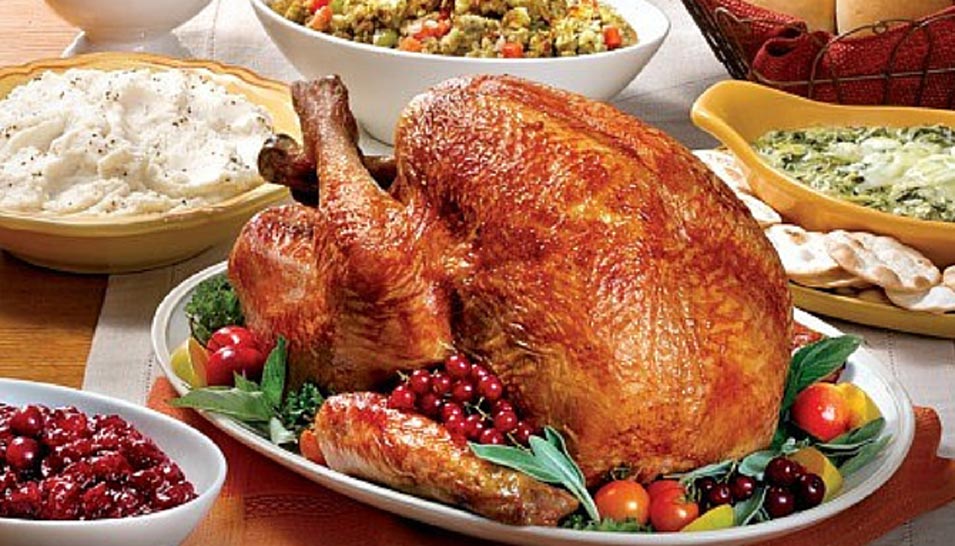
Thanksgiving Cornucopia
On Thursday of this week, Americans will celebrate their Thanksgiving. This is a time when families and friends gather together to celebrate fellowship and give thanks for God's blessings. The tradition dates to the early days of European colonization of North America and has become inextricably tied to Pilgrim settlers in the Plymouth Plantation and a feast they held in late 1621 to celebrate a successful harvest.
Twenty years later William Bradford included a first-hand account of the event in his History of Plymouth Plantation:
"They began now to gather in the small harvest they had, and to fit up their houses and dwellings against winter, being all well recovered in health and strength and had all things in good plenty. For as some were thus employed in affairs abroad, others were exercising in fishing, about cod and bass and other fish, of which they took good store, of which every family had their portion. All the summer there was no want; and now began to come in store of fowl, as winter approached, of which this place did abound when they came first (but afterward decreased by degrees). And besides waterfowl there was great store of wild turkeys, of which they took many, besides venison, etc. Besides they had about a peck of meal a week to a person, or now since harvest, Indian corn to that proportion. Which made many afterwards write so largely of their plenty here to their friends in England, which were not feigned but true reports."
In 1863, Abraham Lincoln made Thanksgiving a national holiday, setting aside the last Thursday of November. In 1939, Franklin D. Roosevelt changed the date to the fourth Thursday of November in response to complaints from merchants that in years when there were five Thursdays in November, Thanksgiving came too close to Christmas and negatively impacted their sales.

First Thanksgiving
Myths surround the origins of American Thanksgiving, and popular depictions of the holiday have been heavily romanticized. The Indians did not introduce the Pilgrims to popcorn that day, and potatoes and sweet potatoes had not yet been grown in New England. That first Thanksgiving meal likely included clams, mussels, lobsters, eels, ground nuts, acorns, walnuts, chestnuts, squashes, and beans as well as fruits and berries such as strawberries, raspberries, grapes, and gooseberries. For lovers of pumpkin pie, it is reliably claimed that Indians introduced pumpkins to the Pilgrims that day. That original Thanksgiving was a continuation of traditional harvest celebrations common both to the Pilgrims back in England and the native Wampanoag tribe in America.
Canadians celebrate their own Thanksgiving Day yearly on the second Monday of October, continuing a tradition that can be traced all the way back to 1578, when English explorer Martin Frobisher, in search of the fabled Northwest Passage, arrived in Newfoundland. Frobisher wanted to give thanks to God for his safe arrival in the New World, thus laying the historical foundation for Thanksgiving Day in Canada forty-three years before the Pilgrims staged their famous feast in Massachusetts. While Canadian Thanksgiving is more firmly rooted in the celebration of the harvest season than is American Thanksgiving, both Canadians and Americans celebrate the holiday with parades, family gatherings, turkey, and pumpkin pie. Thanksgiving in Canada was made an official national holiday by an act of Parliament in 1879. It is said that the American tradition of serving turkey on Thanksgiving was introduced into Canada by United Empire Loyalists around the time of the American Revolution.

Map of the World Based on Voyages
In various ways at various times of the year, other countries around the world celebrate harvest-related festivals similar in key ways to American and Canadian Thanksgiving, most notably Liberia, founded by freed American slaves, and Norfolk Island, where an American trader in the 1800s introduced the feasting tradition.
There is a host of conflicting stories about how turkeys got their name.
According to one version, turkeys, which are native to North America, were unknown in Europe until Spanish conquistadors brought sample birds back from the New World in the early 1520s. Europeans saw a resemblance between those birds and guinea fowl. Although the latter bird is native to eastern Africa, it was originally imported into Europe through the Ottoman Empire present-day Turkey). Guinea fowl came to be known as "turkey-cocks" or "turkey-hens". As a result of mistaken identity, the birds first brought back by the conquistadors became known as "turkeys" and the name stuck even after it was established they were a separate distinct breed.
A less common (but more colorful) version claims that when colonists first saw turkeys they likened the bird's colorful plumage to the multi-colored uniforms worn by palace guards of the Ottoman Empire. Hence the name turkey.

Thanksgiving Dinner
Despite much controversy about their name, one thing is known for certain about the birds Americans call turkeys: They did not originate in Turkey.
In various ways at various times of the year, other countries around the world celebrate harvest-related festivals similar in key ways to American and Canadian Thanksgiving, most notably Liberia, founded by freed American slaves, and Norfolk Island, where an American trader in the 1800s introduced the feasting tradition.
Elsewhere, on the first Sunday of October, Germans celebrate Erntedankfest to give thanks for a good year and good fortune. Every November 23, meanwhile, Japan celebrates Kinrō Kansha no Hi, a national public holiday that recognizes hard work and community involvement.
Other countries credited with Thanksgiving-like celebrations include China, South Korea, Vietnam, and Granada.
To all of our fellow members of the extended Aramco family, in whatever country you may live, we, the staff at AramcoExPats, warmly extend to you our heartiest greetings. We shall be giving thanks this Thursday here in America for having so many wonderful friends and colleagues like yourselves around the world. To all of you, we say: